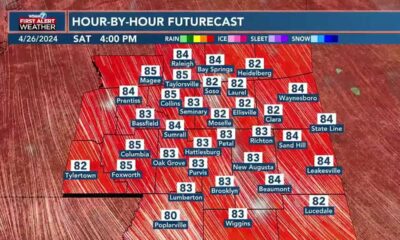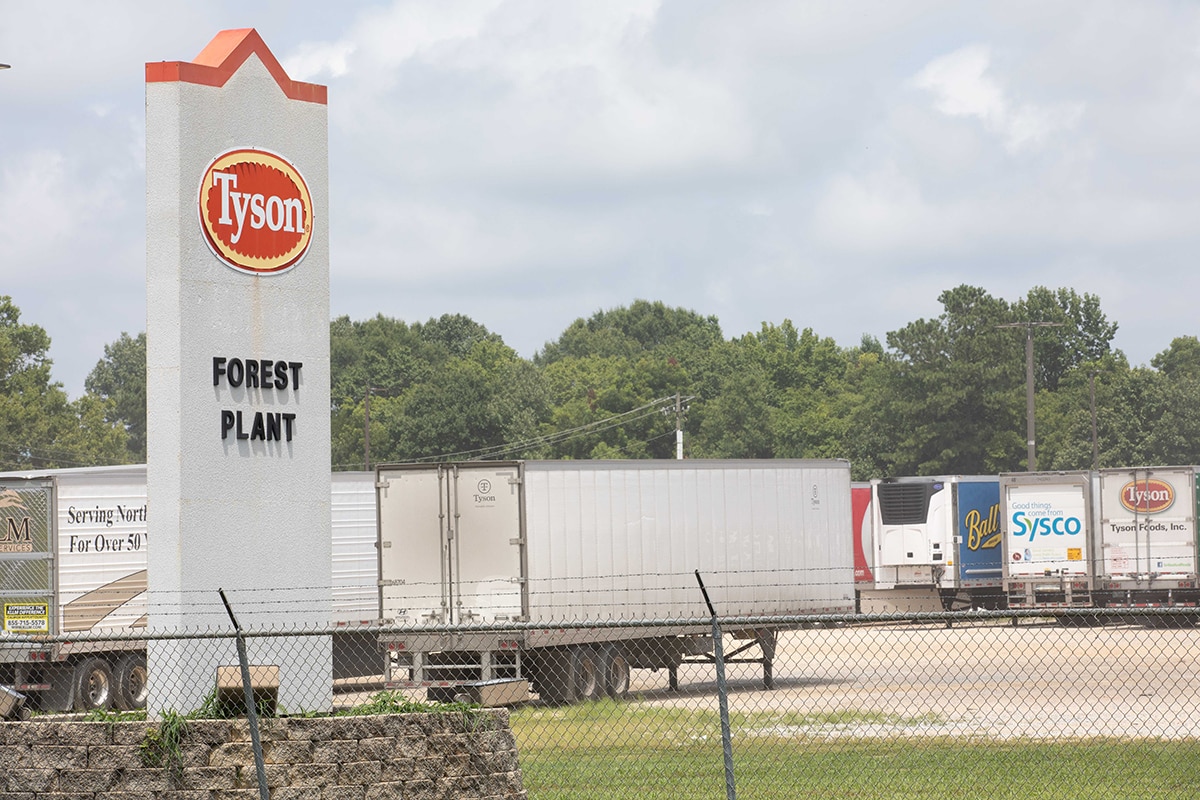Mississippi Today
Mississippi lawmakers look to other states’ Medicaid expansions. Is Georgia worth copying?
As the Mississippi Republican-led Legislature considers expanding Medicaid for the first time after a decade-long debate, Senate leaders have referenced other Southern states' expansion plans as alternatives to full expansion.
On Wednesday, the Senate Medicaid Committee passed the House Republican expansion bill with a strike-all and replaced it with its own plan, which Medicaid Chairman Kevin Blackwell, R-Southaven, called “expansion light.” The Senate is expected to take the bill up for a floor vote Thursday, with a plan that's nearly identical to Georgia's.
Problems with “Georgia Pathways”
Health care policy experts don't think Georgia's plan is worth emulating. The state's plan, called “Georgia Pathways,” misses out on the increased federal match of 90% that the law grants to newly expanded states, and it also doesn't qualify for the additional $690 million federal dollars that would make expansion free to Mississippi for four years.
And the plan, touted as a conservative alternative to what critics call “Obamacare,” has cost state taxpayers $26 million so far, with more than 90% of that going toward administrative and consulting costs, according to KFF Health News. Implementing work requirements is costly and labor intensive because it involves hiring more staff and processing monthly paperwork to confirm enrollees are employed.
“Georgia's plan has proven to be very profitable for large companies like Deloitte (the primary consultant for Georgia's project) but has provided health care to almost no one who needs it,” said Joan Alker, Medicaid expert and executive director of Georgetown University's Center for Children and Families. “It's been a terrible waste of taxpayer dollars so far.”
If the Senate plan were signed into law, Mississippi would fare the same – receiving its regular federal match of only 77% instead of 90% – and risk large administrative costs for enforcing a 120-hour-a-month work requirement and a provision that says recipients must be recertified four times a year.
Work requirements ‘costly' to enforce
In theory, a work requirement isn't controversial. A majority of Mississippi lawmakers in both chambers want to reserve Medicaid coverage for those who are working or exempt, with legislation that incentivizes employment in the state with the lowest labor participation rate. The problem, experts say, is that in practice, it can do more harm than good.
Policing and enforcing the work requirement costs more than it would cost to insure the small population of unemployed people who would become eligible for Medicaid under traditional expansion, explained Morgan Henderson, principal data scientist at the Hilltop Institute, a nonpartisan research group that conducted several studies detailing what Medicaid expansion would look like in Mississippi.
“Medicaid work requirements are costly to implement,” Henderson said. “States have to develop new administrative systems which can cost millions, or tens of millions, of dollars. Additionally, employment reporting requirements can be confusing and burdensome for individuals, so people who are legitimately employed and income-eligible for Medicaid may be denied coverage – thus, hurting the exact individuals who are supposed to qualify for Medicaid with work requirements.”
In Georgia, only 3,500 people have signed up since the program began in July – despite the millions of dollars taxpayers have paid to run the program and officials' previous estimate that roughly 25,000 people would sign up in the first year and 52,000 by the fifth year.
Lt. Gov. Delbert Hosemann said in an interview in February that the Mississippi Senate plan likely wouldn't be as strict as Georgia's, calling their work requirement “onerous.”
But the Senate plan is even stricter than Georgia's, calling for at least 120 hours of work a month instead of the 80 hours required in Georgia.
In Arkansas, a work requirement was briefly implemented in 2018 before it was overturned.
A study by the New England Journal of Medicine found Arkansas' work requirement to be unsuccessful at increasing employment. The main consequence of the state's work requirement was an increase in the number of uninsured persons compared to full expansion and “no significant changes” in employment associated with the policy, according to the study.
In addition, “more than 95% of persons who were targeted by the policy already met the requirement or should have been exempt.”
What's next?
The only expansion bill still alive in the Mississippi Legislature is House Bill 1725, authored by Speaker Jason White, R-West, and Missy McGee, R-Hattiesburg, which is now before the Senate. The bill, as passed by the House, has a provisional work requirement, but would expand Medicaid to 138% of the federal poverty level – even if a work requirement is not approved by federal Centers for Medicare and Medicaid Services.
That's important because during the Biden administration, the federal government has rescinded work requirement waivers previously granted under the Trump administration and has not approved new ones.
But the Senate version is entirely contingent on the work requirement, calling for a minimum of 120 work hours a month and quarterly recertification. Eligibility also only goes up to 100% of the federal poverty level.
If the Senate were to stand firm on the work requirement, expansion might not go into effect until well into 2025. That is, if a new administration takes office.
A provision in North Carolina's recent expansion bill could prove useful as Mississippi lawmakers debate the details of expanding Medicaid.
A North Carolina expansion bill passed in 2023 is a mostly-traditional expansion plan with a unique work requirement provision. Expansion originally passed without a work requirement, but included a provision that says if or when a federal administration that favors the concept takes office, the state will change Medicaid eligibility rules and adopt the work requirement.
If Mississippi were to include this kind of language in its own bill, it could expand Medicaid in 2024 or at the start of 2025, instead of waiting well into a new presidential term.
In theory, work requirements make sense, Henderson said. But they haven't produced the desired outcome of increasing the labor force participation rate in other states. That fact, coupled with the costly administrative burden of enforcing them and the unfortunate consequence of eligible enrollees losing coverage make the work requirement an unworthy pursuit, Henderson and Alker conclude.
“In theory, it's true that, under Medicaid expansion, individuals earning slightly more than 138% of the federal poverty level could have an incentive to reduce their earnings in order to qualify for Medicaid,” said Henderson. “However, there are reasons to believe that this will be rare.”
The three reasons Henderson gives are: “First, not all workers know their exact income as a fraction of the current federal poverty limit, which changes every year and is a function of household size. Second, not all workers can control their hours. Third, individuals earning just above 138% of the federal poverty level have access to generous subsidies through the insurance marketplace, which could reduce the incentive to reduce income to qualify for Medicaid.”
And in practice, Henderson said, “no studies I'm aware of have found evidence of Affordable Care Act Medicaid expansions having adverse effects on employment outcomes.”
The Senate is expected to vote on House Bill 1725 on Thursday. While the bill only needs a three-fifths vote to pass the floor, it realistically needs a two-thirds majority from both chambers to show it has the potential to override a threatened veto from Republican Gov. Tate Reeves.
This article first appeared on Mississippi Today and is republished here under a Creative Commons license.
Mississippi Today
House, Senate close in on Medicaid expansion agreement
Senate leaders have agreed to expand Medicaid coverage to people earning up to 138% of the federal poverty level or about $20,000 annually as is allowed under federal law.
The movement by Senate leaders to cover those earning up to 138% of the federal poverty level is a major step in finally reaching agreement to adopt a Medicaid expansion program as 40 other states have done to cover primarily the working poor.
The House passed a bill earlier this session to cover those earning up to 138% of the federal poverty level. It is estimated the House bill would cover at least 200,000 Mississippians. The Senate, on the other hand, passed legislation to cover those earning less than 100% of the federal poverty level or about $15,000 per year. Senate leaders estimated their plan would have covered about 40,000 people.
During open negotiations earlier this week, House Medicaid Chair Missy McGee, R-Hattiesburg, urged her Senate colleagues to agree to expand Medicaid coverage that would result in drawing down maximum federal funds.
On Friday, Lt. Gov. Delbert Hosemann, who presides over the Senate, announced his leadership team was agreeing to cover those earning up to 138% of the federal poverty level.
Earlier this week, McGee offered a compromise where those earning less than 100% of the federal poverty level would be covered through traditional Medicaid. But those earning between 100% and 138% would be covered through private insurance policies through the federal marketplace exchange.
But the cost of those policies would be paid through state funds and federal Medicaid funds. The federal government pays 90% of the cost for those covered through Medicaid expansion, estimated to be about $1 billion a year for Mississippi. In addition, the federal government is providing incentives to expand Medicaid for the 10 states that have not. Those incentives would provide about $700 million additional funds to Mississippi over a two year period.
The original Senate plan would not have been considered ACA Medicaid expansion and would not have qualified for the increased federal funding.
In a news release, the Senate leaders said they would be willing to cover people earning up to 138% of the federal poverty level using the private insurance policies to cover those earning between 100% and 138%.
While the Senate's willingness to provide Medicaid coverage to those up to 138% of the federal poverty level is a major step, there are still issues to be resolved as the session nears an end before Medicaid expansion is a reality in Mississippi.
Senate officials said they are still insistent that the expansion plan include a stringent work requirement and monitoring system for those covered through expansion. The Senate proposal would instruct the state Attorney General to file a lawsuit to try to overturn the federal government's expected denial of the work requirement.
A news release from Hosemann's office said a work requirement is “a non-negotiable element.” Under the Senate offer, Medicaid would not be expanded until the work requirement is approved either through the federal Medicaid officials or through the federal courts.
House leaders said they also want a work requirement, and included one in the original House proposal. However, should the federal government deny it — as expected — the program would still go into effect — a pragmatic move, House leaders said.
In the news release, Hosemann added, “We are hopeful a compromise is on the horizon. When people are healthy, they are working, raising their families, and contributing to their communities. Access to healthcare is a critical component of economic and workforce development efforts in Mississippi—and reforming healthcare is the right thing to do.”
The work requirement is one obstacle that must be resolved. In addition, Gov. Tate Reeves has said he would veto any bill expanding Medicaid. It would take a two-thirds vote by both chambers to override a veto. The House is expected to easily muster more than a two-thirds vote. But Reeves has been lobbying Senators hard against expansion, and the vote there is less assured.
Under current law, Medicaid in Mississippi covers the disabled, poor children and poor pregnant women, certain primarily caregivers living in extreme poverty and certain segments of the elderly population.
The Senate, when it delivered its compromise offer, also called for the House to reconsider its initial plan, which had passed the Senate by a two-thirds margin.
Senate leaders also called for the House to consider changes to the state's original Medicaid program that the Senate had proposed earlier in the session. These changes include making it easier for severely disabled children to receive Medicaid coverage and preserving changes made last year to the hospital tax which provides additional federal money for hospitals.
Mississippi Today reporter Taylor Vance contributed to this story.
This article first appeared on Mississippi Today and is republished here under a Creative Commons license.
Mississippi Today
Experts dispel fears that Medicaid expansion is too costly for Mississippi
National studies and experts in Medicaid expansion states refute concerns voiced in Mississippi's legislative conference committee that costs to the state would exceed projections.
Among those dispelling that fear are experts and a former governor in Kentucky – one state Mississippi conferee and Senate Medicaid Chairman Kevin Blackwell referred to as an example of where expansion has been expensive.
One study in the National Bureau of Economic Research that analyzed state budget data over an eight-year period found that changes in state spending were “modest and non-significant” after Medicaid expansion, and “state projections (of cost) in the aggregate were reasonably accurate, with expansion states projecting average Medicaid spending from 2014-2018 within 2 percent of the actual amounts, and in fact overestimating Medicaid spending in most years.”
Senate negotiators on Tuesday said they fear more people than estimated would enroll in Medicaid under expansion, and that this would result in higher-than-estimated costs to the state.
House Medicaid Chairwoman Missy McGee, R-Hattiesburg, reiterated that multiple studies – including one done this month on expansion's potential impact in Mississippi by a nonpartisan research organization – found that traditional expansion would result in savings to the state, not increased costs.

The study found that traditional expansion – insuring those making up to 138% of the federal poverty level or about $20,000 annually for an individual – would cost the state nothing in the first four years of implementation, and roughly $3 million the following year. It would stimulate the economy, putting about $1.2 billion into circulation that the state would not see otherwise and creating 11,000 new jobs in Mississippi, in addition to providing health insurance for poor working people and cutting uncompensated care costs for state- and locally owned hospitals by 60% each year.
While Medicaid enrollment after expansion could exceed projections, that possibility was taken into account by Hilltop's report, which estimated 95% of enrollees would be newly eligible. According to the study, about 200,000 Mississippians would enroll in Medicaid post-expansion.
Sen. Brice Wiggins, R-Pascagoula, said he believes the Senate's original plan is a pragmatic proposal that offers savings – “whereas 44 other states have not been that,” he said, referencing the 40 – not 44 – expansion states. The original Senate plan covers fewer people than the House plan, includes a stringent work requirement unlikely to be approved by the federal government, and doesn't qualify for increased federal funding.
Blackwell also made a similar comment, asking his House counterpart “Have any of (the states) – I guess how many exceeded the number of population they estimated at onset? I think 40.”
Blackwell later offhandedly told a reporter he heard from a fellow lawmaker in Kentucky expansion had been expensive.
Asked what their sources were regarding their statements about Medicaid expansion costs, Wiggins referred questions to fellow conferee Sen. Nicole Boyd, R-Oxford, who declined to comment. Blackwell said he was unable to provide any sources because they “are still working on the bill” and suggested the reporter read an opinion piece by a conservative columnist whose past views have aligned with those of Gov. Tate Reeves, a Medicaid expansion opponent.
Dr. Ben Sommers, a health economist and primary care physician based in Boston, is the author of the National Bureau of Economic Research study that found minimal changes in state spending in expansion states. He shared three additional publications with Mississippi Today that show there is no evidence of expansion negatively impacting state budgets.
“There's a difference between saying that enrollment was higher than expected and that the state budget impact was worse than expected. More people enrolling than projected doesn't mean that states lost money … expansion states were able to bring in 90% federal funding which often replaced things like behavioral health and uncompensated care spending that the state was previously paying for with 100% state dollars,” Sommers told Mississippi Today.
Morgan Henderson, one of the authors on the Hilltop report, echoed Sommers. And even with a lower matching rate from the federal government in current years, Henderson, who has a PhD in economics, believes the costs to states are still offset by other benefits.
“Higher enrollment than expected in the expansion group can lead to higher costs than expected, but this relationship likely won't be one-for-one. More new enrollees can also mean more cost offsets – such as premium tax revenue and other state tax revenue due to the increased economic activity in the state – which significantly mitigate the costs of expansion,” he told Mississippi Today.
Experts and a former governor in Kentucky – one state Blackwell referred to as an example of where expansion has been costly – said that Sommers' and Henderson's characterizations are accurate for what their state experienced post-expansion.
A study published by the University of Louisville Commonwealth Institute of Kentucky found that while Kentucky did experience an increase in its Medicaid budget, the increase has been offset by other benefits, such as savings in general state funds “related to care for vulnerable groups who were ineligible for Medicaid prior to expansion.”
Expansion funneled $2.9 billion into the state's health care system within the first two years, which reduced costs of charity care and collections for medical debts, the study said.
Even if the number of enrollees is higher than originally estimated, that doesn't necessarily bode poorly for the state's budget, Sommers said. On top of the 90% federal match and the increased federal incentives for newly expanded states, the leftover portion the state is responsible for under expansion is mitigated by increased tax revenue, reduced uncompensated care costs to hospitals, and other program cost offsets, Sommers explained.
While the state does put up a small amount of money for each new enrollee under expansion, it is less expensive than the amount of money the state pays pre-expansion to cover uninsured individuals who seek care in emergency rooms and inpatient hospital settings – the most expensive places to receive care and often the only option for uninsured people.
Mississippi hospitals incur around $600 million in uncompensated care annually. Kentucky's hospitals saw a 64% decrease in uncompensated care costs from 2013 to 2017, according to the Center on Budget and Policy Priorities.
“Everybody's got heartburn over people ‘getting something they don't deserve,'” Dr. Dustin Gentry, a rural physician from Louisville, Mississippi, and self-described conservative, said. “But they're getting it anyway. They go to the ER, they get free care, they don't pay for it, but that doesn't bother anybody. But if they get Medicaid, which will actually pay the hospitals for the work they do, all of a sudden everybody's got heartburn.”
One report estimates that nearly half of all Mississippi's rural hospitals are at risk of closure.
And while the original House and the Senate plans both cover those in the coverage gap – those making too much to qualify for Medicaid currently but too little to afford private insurance plans – the House proposal would draw down $1 billion federal dollars the original Senate plan would not, since it is not considered true “expansion” according to the Affordable Care Act. That means the state would have to shell out more money, receiving its typical 77% federal match instead of 90%, and would not qualify for the additional funds that would make expansion free to the state for the first four years under the House plan.
In the last 10 years, as 40 states have chosen to expand Medicaid to cover the working poor, the poorest and sickest state has held out.
After leaving House conferees alone at the negotiating table Thursday afternoon, the Senate announced its own compromise plan Friday morning. The option extends coverage to those making up to 138% of the federal poverty level and draws down the maximum amount of federal dollars available.
Lawmakers have until Monday to pass a final bill, according to current deadlines.
This article first appeared on Mississippi Today and is republished here under a Creative Commons license.
Mississippi Today
Mississippi company listed among the ‘Dirty Dozen’

A chicken processing company and a staffing agency that allowed a teenager to clean machines at a Hattiesburg plant, leading to his death, have landed on a national list of unsafe and reckless employers.
The National Council for Occupational Safety and Health assembled its “Dirty Dozen” list compiled through nominations and released its report Thursday during Workers' Memorial Week.
“These are unsafe and reckless employers, risking the lives of workers and communities by failing to eliminate known, preventable hazards – and in at least one case, actively lobbying against better protections for workers,” the report states.
More than half of the companies included on the list have locations in Mississippi.
Marc-Jac Poultry and Onin Staffing
Onin Staffing hired 16-year-old Duvan Perez and placed him at the Mar-Jac Poultry plant in Hattiesburg. The night of July 14, 2023, he died after being pulled into a deboning machine.
Federal law prohibits children from working in dangerous conditions such as meat processing plants, especially because of the machinery. In January, OSHA cited Mar-Jac for 17 violations relating to the teenager's death and proposed over $212,000 in penalties.

Mar-Jac said it relied on Onin to verify employees' age, qualifications and training, and Onin denied being Duvan's employer, according to court records. An attorney for Mar-Jac told NBC News the teenager used identification of a 32-year-old man to get the job.
In February, Duvan's mother filed a wrongful death lawsuit against Mar-Jac and Onin in the Forrest County Circuit Court. Responding to the complaint, both companies denied most of the allegations.
“The plaintiff's decedent's negligence was the sole and/or proximate contributing cause of plaintiff's injuries,” Mar-Jac states in its response to the complaint.
Since 2020, two other workers have died at the Hattiesburg poultry plant, and workers have suffered amputations and other injuries, according to court records.
To date, OSHA has cited Mar-Jac nearly 40 times for violations in the past decade, according to agency records.
Tyson Foods
The company has operations across the country, including two mills in Carthage and Ceres, as well as hatcheries, feed mills, truck stops and other offices across Mississippi.
The report said six workers have died since 2019 and over 140 have been injured from ammonia leaks, none of them in Mississippi. The gas is often used to refrigerate meat, and according to the Centers for Disease Control and Prevention, exposure to the gas in high doses can be fatal.
The report also said the company is under investigation for child labor violations, assigning children to work in dangerous high-risk jobs, which is illegal.
In the past decade, OSHA has issued over 300 citations against Tyson, according to agency records.
When asked about what it takes to get companies with a poor history of worker safety to protect employees, Jessica Martinez, co-executive director of COSH, said change is needed from all fronts, including having government agencies like Occupational Health and Safety Administration conduct routine inspections.
She said workers are too fearful to complain. “They need these jobs for survival. Workers are fearful of losing their jobs,” she said.
Uber and Lyft
Nationwide, over 80 drivers for the rideshare apps have been killed on the job since 2017, according to Gig Workers Rising. The report says this is a sign that drivers are pressured to accept unsafe riders.
Internal documents have shown 24,000 “alleged assaults and threats of assault” against Uber drivers, and workers of color and immigrants experience most of the danger, according to the report.
JC Muhammad, a Lyft driver and organizer with the Chicago Gig Alliance, was physically assaulted by a passenger, and said the companies need a complete overhaul in how they protect drivers, including verification of passenger identification.
In his situation, another person, allegedly the mother of the passenger, called for the ride. There was no verification for the person, and the passenger did not have an ID. Muhammad said he had no way to report what happened to police because he lacked the necessary information.
“We've had drivers robbed, assaulted, shot at,” he said during a Thursday press conference. “There are no protections, no protocols.”
In Mississippi, several drivers have been injured, including a woman grabbed by a drunk passenger in Ocean Springs in 2019; a man assaulted by his passenger in Oxford in 2021 and a woman driver shot in the head by a passenger in Gulfport in 2023.
Two other companies included in the report are Waffle House and Walmart, which were cited for inadequate security to protect workers and customers and a lack of worker protections. Both have locations in Mississippi and have had incidents occur here, including shootings and fights.
This article first appeared on Mississippi Today and is republished here under a Creative Commons license.
-
228Sports7 days ago
From Heartbreak to Hoop Dreams: Pascagoula Panthers Springboard from Semifinal Setback to College Courts
-
Local News2 days ago
Sister of Mississippi man who died after police pulled him from car rejects lawsuit settlement
-
Mississippi News6 days ago
2 dead, 6 hurt in shooting at Memphis, Tennessee block party: police
-
Mississippi News6 days ago
Forest landowners can apply for federal emergency loans
-
Mississippi Today2 days ago
At Lake High School in Scott County, the Un-Team will never be forgotten
-
Mississippi News5 days ago
Cicadas expected to takeover north Mississippi counties soon
-
Mississippi News4 days ago
Viewers make allegations against Hatley teacher, school district releases statement – Home – WCBI TV
-
Mississippi News6 days ago
Nationwide health alert issued for ground beef over potential E. coli risk





































